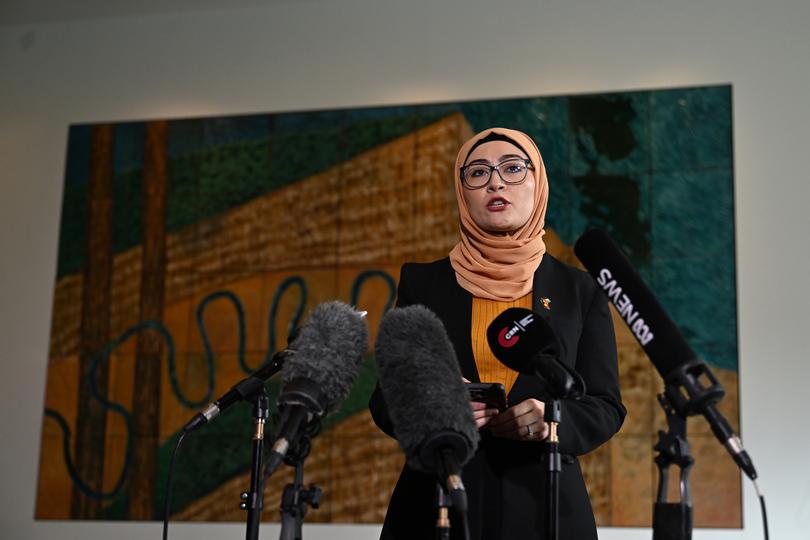PM’s warning over faith-based political movements after Senator Fatima Payman quits ALP
Prime Minister Anthony Albanese says he does not want Australia to “go down the road of faith-based political parties” amid speculation about Senator Fatima Payman’s future.
Prime Minister Anthony Albanese has declared he does not want Australia to “go down the road of faith-based political parties”, arguing they could undermine social cohesion amid speculation about Senator Fatima Payman’s future.
The first-term WA senator spectacularly quit the Labor Party on Thursday, saying she felt she had “no choice” but to do so over what she felt was the party’s “indifference” to the conflict in Gaza.
“I see no middle ground and my conscience leaves me no choice,” she said.
Sign up to The Nightly's newsletters.
Get the first look at the digital newspaper, curated daily stories and breaking headlines delivered to your inbox.
By continuing you agree to our Terms and Privacy Policy.She will now sit as an independent on the Senate crossbench, despite Labor beginning a concerted campaign to force her out of the seat and return it to the party.
But there has been speculation that Senator Payman could seek to join or form her own Muslim-aligned political party after community activists in Labor-held western Sydney seats began mobilising and met with Glenn Druery, “the preference whisperer”, who has long worked with micro-parties.

The Muslim Vote, which declares it is “not a political party”, says it supports campaigns and candidates across Australia who share our “principles of justice and fairness”.
“The Muslim Vote is not a religious campaign, but a political one,” a statement from Wednesday read.
Mr Albanese on Friday said such political movements could have an impact on already-fraught social cohesion, adding that his own Government demonstrated why faith-based parties were not needed.
“My party has around the cabinet … people who are Catholic people, who are Uniting Church, people who are Muslim, people who are Jewish, that is the way that we’ve conducted politics in Australia,” he said.
Opposition leader Peter Dutton also warned against sectarianism in Australia, saying that an elected senator was there to represent the entire state or territory — not one religious group.
Meanwhile, Mr Albanese also took a huge swipe at the renegade senator’s intention to be a “voice” for Western Australia, arguing she had never stood up to put the state’s perspective on the table at caucus meetings.
In response to Senator Payman telling The West Australian on Thursday she intended to “truly represent (WA voters) without boundaries”, Mr Albanese said WA voters had been clear they “wanted to elect a Labor government” at the 2022 election.
“Fatima Payman received around about 1600 votes in the WA election. The ALP box above the line received 511,000 votes,” he said on Friday.
“It’s very clear that Fatima Payman is in the Senate because people in WA wanted to elect a Labor government and that’s why they put a number one in the box above the line next to Australian Labor Party rather than vote below the line for any individual.”
Mr Albanese added that Senator Payman had not aired her grievances during the party’s caucus process in the weeks before she quit.
“At no stage – no stage – did Senator Payman stand in the caucus and make any comments about the Middle East, or about anything else, about Western Australians or about anything else,” he said.
“No comments in the time in which Senator Payman has had the privilege of serving in the Senate as a Labor senator.”
Mr Albanese also maintained he did not have concerns over Senator Payman’s citizenship after senior Labor figures began backgrounding against her over concerns that her Afghanistan dual-citizenship could be a possible breach of section 44 of the Constitution.
She still holds dual citizenship and has been unable to complete the renouncement process because the Taliban took over the country.
Mr Dutton said it was an indictment on the Labor Party if such concerns came to be valid.
“It’s pretty red hot if there is a constitutional issue the Labor Party knew about it, so they’ve supported a Member of Parliament knowing that she wasn’t constitutionally valid to sit in the Parliament – which I think is an outrage. That’s quite different than somebody who has a Section 44 issue. So, there’s that question to answer,” Mr Dutton said on Friday morning.
But WA Labor sources said the party had firm legal advice at the time of her selection as a candidate that she had taken the necessary steps to renounce her Afghan citizenship and it was confident she was eligible to nominate.
Asked if he held any concerns, Mr Albanese said on Friday morning he did not.“Well, I haven’t,” Mr Albanese said in response to a question over why her citizenship was only being questioned now.
Asked if he would refer the matter to authorities, Mr Albanese also ruled out doing so.“No, in terms of my job, that’s a matter for Ms Payman,” he said.Senator Payman claims she has received legal advice in contravention of the Constitution which bars dual citizens from sitting in parliament, arguing that the process is impossible given the Taliban’s control in Afghanistan.“(It) is not in the interests of smaller minority groups to isolate themselves, which is what a faith-based party system would do. I notice well that many people who are refugees in Australia have fled theocracies, have fled regimes that have been based upon so-called religion that has resulted in the oppression of people who do not subscribe to what (are) often extreme forms,” she said.
